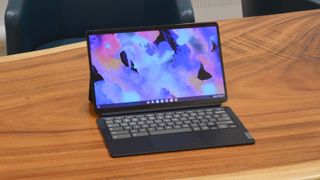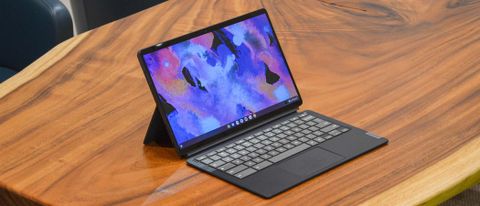TechRadar Verdict
While not the most powerful Chromebook on the market, the Lenovo IdeaPad Duet 5 Chromebook still packs a punch along with outstanding battery life, a gorgeous display, and a new form factor that improves on last year's model – as long as you're looking for a laptop more than a tablet.
Pros
- +
Gorgeous display
- +
Phenomenal battery life
- +
Respectable performance
- +
Bigger keyboard
Cons
- -
Flimsy keyboard
- -
Difficult kickstand
- -
Stylus not included
- -
Not great as a tablet
Why you can trust TechRadar
Two minute review
Here is the Lenovo IdeaPad Duet 5 Chromebook configuration sent to TechRadar for review:
CPU: Qualcomm Snapdragon 7c Gen2 2.55GHz
Graphics: Qualcomm Adreno GPU
RAM: 8GB LPDDR4
Screen: 13.3-inch 1920 x 1080p multitouch OLED, 400 nits
Storage: 128GB eMMC Flash storage
Ports: 2 x USB Type-C 3.2 Gen1, 1 x Pogo pin connector
Connectivity: Wi-Fi 6, Bluetooth 5.1
Camera (Front): 5MP RGB; (Rear) 8MP RGB w/ autofocus
Weight: 2.24lbs (1.02kg)
Size (W x H x D): 12.04 x 7.35 x 0.28 ins (305.86 x 186.74 x 7.23mm)
Battery: 42WHr w/ Rapid Charge
The Lenovo IdeaPad Duet 5 Chromebook remains one of the best laptops (and certainly the best Chromebook) you can buy, even now that it's three years old. It still offers a premium experience that many Chromebooks simply can't match - especially thanks to its gorgeous OLED display, which puts more expensive laptops to shame.
Because Chromebooks don't need as much power to run, they don't age as quickly as Windows 11 laptops, and that's especially true of the Lenovo IdeaPad Duet 5 Chromebook, which launched with incredibly powerful specifications for a Chromebook, including 8GB of RAM, a Qualcomm Snapdragon 7c Gen2 chip and Wi-Fi 6 support. This made it a brilliant performer when it launched back in 2021, and that remains true today.
At 13.3-inches diagonally, the Duet 5 Chromebook's keyboard is much more like those found on Ultrabooks, which still don't have the most spacious keyboards, but are still much more accessible, and it has a much more comfortable keyboard that its predecessor, the Lenovo IdeaPad Duet Chromebook.
At this size and with a 16:9 screen ratio, though, this is much more of a laptop that can operate as a tablet, as it is a bit unwieldy. This is in contrast to last year's 10.1-inch, 16:10 ratio model, which was a better tablet than a laptop, owing to the cramped keyboard.
The keys on the Duet 5 Chromebook keyboard aren't backlit, like its predecessor, and the keyboard itself is still pretty flimsy, also like its predecessor.
The trackpad could also be better. Our fingers encountering enough friction to give us some uneven swiping and gesturing, but it's not bad enough that you can't get used to it and adjust the amount of pressure you're applying appropriately.
The other accessibility criticism we had of last year's Duet Chromebook – that the magnetic kickstand could be a pain to extend at times – still remains.
A pullable tab or lanyard here could easily fix this deficiency, but it looks like we might have to wait until next year for a better design here (or, you can pick up Microsoft's Surface Adaptive Kit, which will work with any device, not just the Microsoft Surface Pro 8).





The magnetized backplate on Duet 5 Chromebook also has a small cutaway for a Lenovo Active Pen stylus to clip to the back, but the stylus isn't bundled with the device by default, and even when it is included it will cost extra.
Speaking of costs, one of the best things about last year's Duet Chromebook was its price. Starting at $279 / £279 / AU$424, the smaller Duet Chromebook was a fantastic value for the price.
This year's Duet 5 Chromebook is more expensive, starting at $429 ($499 as tested), and AU$799 in Australia. Unfortunately, the UK is in for a tough time as Duet 5 Chromebook starts at an eye-popping £899.
We're hoping that this is only a temporary issue, and we've reached out to Lenovo for some context for the extraordinary price differential in the UK. We'll update this review if we hear back from the company. UK pricing aside, the increased price of the Duet 5 Chromebook isn't unexpected given its larger size and improve hardware.
In terms of improved hardware, we need to start with the display. Last year's Duet Chromebook was a 1,920 x 1,200 LCD IPS panel, which was outstanding for a 10.1-inch screen.
The Duet 5 Chromebook is a step down in resolution to 1,920 x 1,080, but the panel is upgraded to OLED, making it exceptionally bright and vibrant. While both Duets are rated for 400 nits of brightness, the difference with an OLED display is simply incredible.
The OLED display alone more than justifies the increase in price, and the fact that it starts at only $429 in the US makes this a fantastic deal. Even when bumping up to the 8GB RAM configuration for $499, you still get a 13.3-inch 2-in-1 Chromebook with a 1080p OLED display for under $500, which is pretty much unheard of – and it's worth every penny.
Here is how the Lenovo IdeaPad Duet 5 Chromebook performed in our suite of benchmark tests:
Kraken JavaScript: 1,845ms
Octane 2.0 JavaScript: 23,798
Jetstream 2: 83.4
Battery Life (TechRadar movie test): 16 hours 20 minutes
The display isn't the only thing that got an upgrade this year, with the Duet 5 Chromebook stepping up to the Qualcomm Snapdragon 7c Gen2 processor from the MediaTek P60T chip in last year's Duet Chromebook.
Both of these are high-efficiency ARM-based chips, so neither is going to pack the same kind of raw performance as an Intel Core i3 processor, which some of the beefier Chromebooks feature.
The Snapdragon 7c Gen2 is still a huge improvement over the MediaTek P60T. The Snapdragon 7c Gen2 finished the Kraken JavaScript benchmark in 1,845ms, compared to the MediaTek P60T's time of 3,940ms. That's just better than twice as fast as last year's Duet Chromebook.
Still, the Snapdragon 7c Gen2 is lagging in terms of benchmarks vis a vis other Chromebooks, but it still felt reasonable snappy when we were actually using it. So unless you're really looking to directly compare the Duet 5 Chromebook against the Asus Chromebook Flip C536, Google Pixelbook, or the Acer Chromebook Spin 713, you're not likely to see any performance lag – though it will still be there.

Buy it if...
You want the best 2-in-1 Chromebook around
The lightweight and easily convertible form factor here is about as comfortable as it gets, with a decent amount of power and phenomenal battery life.
You want an OLED Chromebook
It's not often you get a premium feature like an OLED display in a Chromebook, but boy howdy is it worth it.
You want outstanding battery life
Very few Chromebooks get this kind of battery life, and with the right tweaks, you can easily get to the 18-19 hours of battery life.
Don't buy it if...
You want a cheap Chromebook
There are some truly premium features on the Duet 5 Chromebook, and that does push the price up into the high end for a Chromebook.
Accessibility is a major consideration
While the larger keyboard is a huge improvement over last year's model, the kickstand might still be challenging for those with more limited hand strength or dexterity.
You want more of a tablet-first form factor
This 2-in-1 laptop puts a heavy emphasis on laptop. The 16:9 screen ratio and 13.3-inch display makes using it in tablet mode somewhat unwieldy.

John (He/Him) is the Components Editor here at TechRadar and he is also a programmer, gamer, activist, and Brooklyn College alum currently living in Brooklyn, NY.
Named by the CTA as a CES 2020 Media Trailblazer for his science and technology reporting, John specializes in all areas of computer science, including industry news, hardware reviews, PC gaming, as well as general science writing and the social impact of the tech industry.
You can find him online on Threads @johnloeffler.
Currently playing: Baldur's Gate 3 (just like everyone else).
